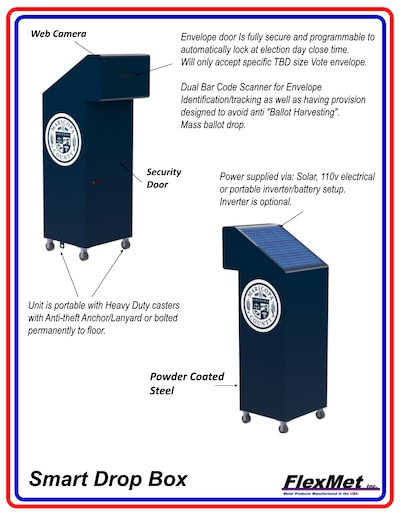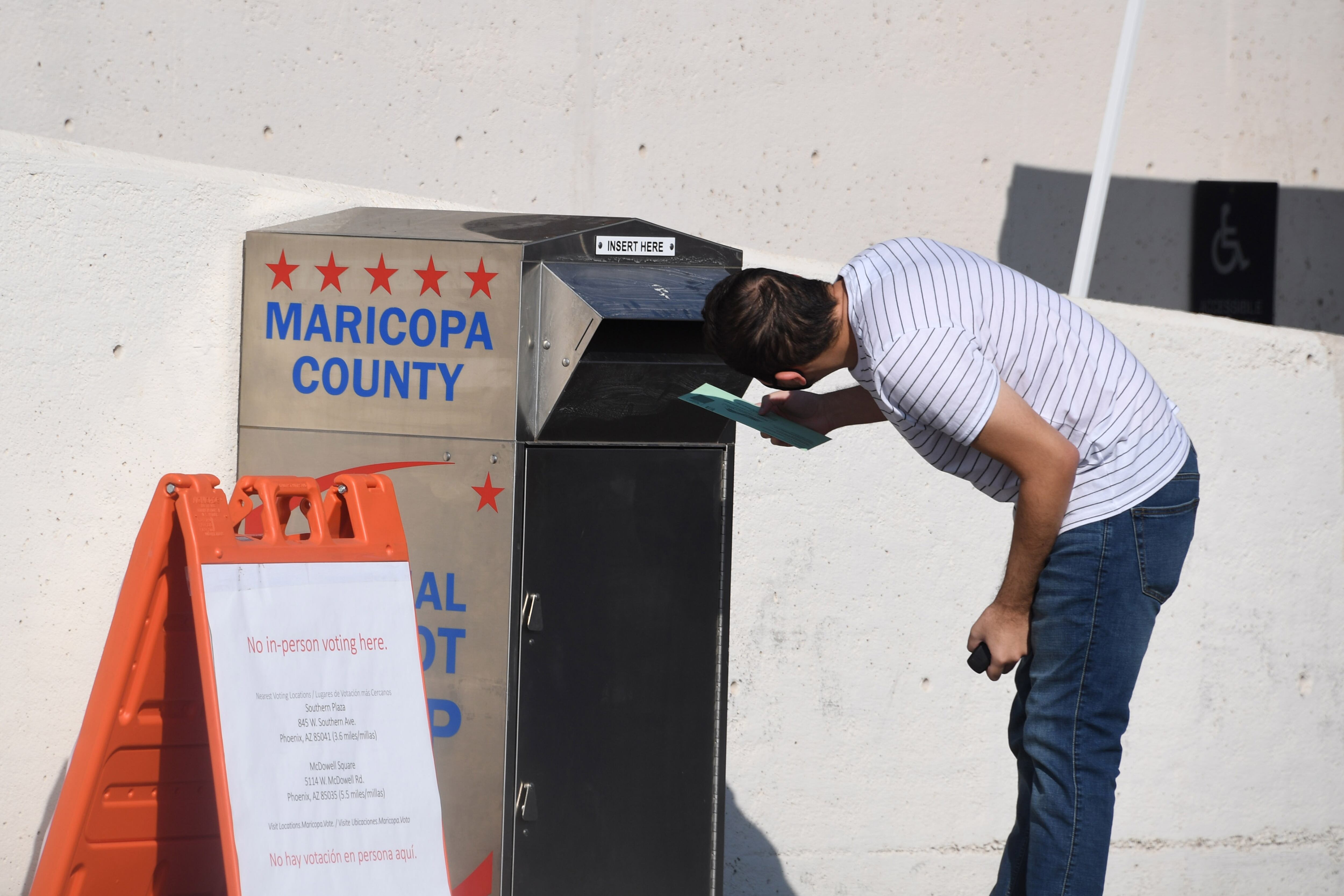Two small election-related measures made it into a budget proposal Arizona lawmakers approved early Thursday morning on a bipartisan vote. With that hurdle cleared, the Legislature could approve more election bills in the coming days.
The two line items total just $1.5 million of a state budget proposal of nearly $18 billion. Both are pilot programs that direct election security grants to counties: $1 million for the testing of ballot paper that incorporates additional security features and $500,000 for ballot drop boxes featuring new surveillance and security elements.
More sweeping policies introduced earlier in the Arizona legislative session sought to strictly limit early and mail voting. One would have required voters using drop boxes to submit ballots exclusively into so-called “smart” ballot boxes, which do not appear to exist as a product. And one Arizona lawmaker spearheaded presentations by a Texas-based company about ballot papers with specific inks and watermarks.
Observers predicted that legislators could use the budget bill as a vehicle to pass extensive election law changes. An Arizona Supreme Court ruling last year clarified that the process of “logrolling,” or adding unrelated items into the budget, was illegal. In the wake of that ruling, lawmakers this year introduced more budget bills and included minimal non-budget policies in them.
Voters will not see the new ballot boxes or special ballot paper from the pilots in this year’s elections.
“There’s really no time to get this pilot done for November,” Runbeck Election Services CEO Jeff Ellington said of the “smart” boxes. “They’ve missed those deadlines.”
Though the election-related elements of the budget aren’t nearly as extensive as some at the Capitol expected, they aren’t getting approval from Democrats.
“Both are borne of the conspiracy theories surrounding elections and are a complete waste of state resources,” Senate Minority Leader Rebecca Rios told Votebeat via text. “Neither the [secretary of state] or any of the county recorders asked for these pilot programs. They will further fuel the conspiracy theorists.”
“Smart” ballot boxes
The line item on ballot boxes designates $500,000 to purchase and put in place ballot drop boxes that have 24/7 photo and video surveillance. The boxes would need other features ensuring they accept only one ballot at a time, create a receipt of each ballot, and reject ballots if the camera isn’t working.
The bill specifies that these boxes, 16 in total, will be piloted in Cochise, Yuma, and Pinal counties.
The state’s Election Procedures Manual already calls for ballot boxes to be placed in secure locations, subject to approval by each county’s board of supervisors.
It’s not clear why these three counties were chosen for the pilot program, though Jennifer Marson, the executive director for the Arizona Association of Counties, said the counties “are aware and consented to be test counties.”
Cochise County Recorder David Stevens told Votebeat that he was asked to be part of the pilot program by Sen. Kelly Townsend, a Republican from Apache Junction who previously sponsored a bill with more extensive requirements for so-called “smart” ballot boxes.
Stevens agreed to be part of the pilot, though noted that he doesn’t believe these kinds of boxes exist yet. He received an early photo mock-up of one from an election services vendor, but that’s about it so far, he said. He compared the concept to an ATM, where a voter would put in a ballot and receive a receipt.
“I only have a few boxes in the whole county, so it was kind of an easy county to do a pilot in,” Stevens said.
The mock-up, which Stevens shared with Votebeat, shows a ballot box that looks largely the same as the ones in use now, though the rough design features a camera and a solar panel to power the box’s technology.

“I have no knowledge other than just a picture of one,” Steven said. “And all it does is show the outside of the box, which looks like the boxes I’ve got now.”
Yuma County Recorder Robyn Stallworth Pouquette also said her county didn’t request the ballot boxes but agreed to test them.
“In conversation with a legislator who was exploring new technology, I agreed to ‘pilot’ any new secure ballot boxes at our early ballot drop box locations that would provide receipt to depositing individual and log receipt on site,” she said, via email.
The budget provision is a scaled-back version of Townsend’s Senate Bill 1571, which would have required any county using ballot drop boxes to put these types of security measures in place. During hearings on the bill, which did not pass the Senate, Townsend referred to the technology as “smart” ballot boxes, though such technology didn’t yet exist, opponents said in testimony.
Townsend did not respond to requests for comment.
Ballot paper testing
The election security grants would offer $1 million to county recorders who agree to test special ballot papers in tabulation machines. Those papers would need specific security features, like watermarks or unique ballot identifiers. These features, the bill notes, should enable machines to authenticate a ballot but not otherwise make ballots traceable back to identifiable voters. Counties would be required to report back to the state about how the testing went.
A group of GOP lawmakers proposed legislation this year that could have required a 19-item laundry list of changes to ballot paper designed to prevent fraud, like “holographic foil” and “custom complex security background designs with banknote-level security.” Senate Bill 1120 stalled out in March.
Republican Rep. Mark Finchem, one of Trump’s most ardent supporters in Arizona, pushed for these high-end ballots, setting up presentations by a Texas company, Authentix, which may have been the only company capable of producing them, the Washington Post reported in February.
Finchem did not respond to requests for comment.
Because the budget provision pared the list of required ballot paper elements down from the earlier 19-item checklist, it now could be accomplished by just one company.
Runbeck Election Services, which prints ballots for most Arizona voters, could create the specialty ballots the election provision calls for, Ellington, the CEO, told Votebeat. Though the definitions of what constitutes a watermark or a unique identifier are ambiguous, Runbeck could produce a type of each feature, he said. The trick with a unique identifier, in particular, is finding a way to ensure it doesn’t identify an individual voter.
“So, there’s some stuff there that’s got to be worked through,” Ellington said. “But technically, it’s absolutely possible. It’s just, how do you do it within the bounds of good election practices.”
Ellington also said he was giving Townsend and others a tour of Runbeck’s operations in January when a conversation led to the idea of these “smart” boxes. Runbeck didn’t play any role in deciding where the boxes would be piloted.
There aren’t yet any “smart” drop boxes, he said, but the types of technology exist in other areas and sectors. He estimated a single “smart” box would cost about $10,000–$15,000, compared to about $5,000–$8,000 for a standard box now.
“The tech is all there, it’s just never been brought together this way,” he said.
Ellington said Runbeck is “agnostic” when it comes to the politics behind the bills, and works instead to meet requirements set by lawmakers.
“We’re just threading that needle, so to speak, of trying to at least have a solution that’s doable and the counties can manage, and one that actually fits the letter of the law that the state felt was needed to implement,” he said.
While the technology exists in other sectors, the stakes are higher for a voter trying to properly cast their ballot than for someone buying a soda by inserting a dollar into a machine, Ellington noted.
Stevens, the Cochise recorder, said he didn’t see any harm in participating in the pilot because he’s always interested in improving election processes.
“If I don’t approve of how the box functions, I won’t put them out,” Stevens said. “So I’ll have to have them here, test run them in my office, and then at that point, once I’m satisfied it will operate correctly, place them out. But it won’t happen this year.”
Rachel Leingang is a freelancer for Votebeat and co-founder of the Arizona Agenda. Contact Rachel at rleingang@votebeat.org.




